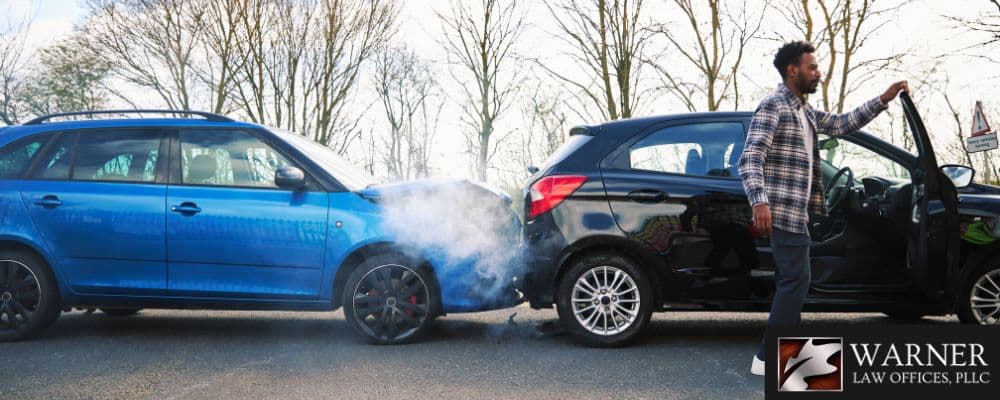
Table Of Contents
- What Is a First-Party Insurance Claim?
- What Is a Third-Party Insurance Claim?
- Key Differences Between 1st Party vs. 3rd Party Claims
- Can I File Both a First-Party and Third-Party Claim?
- How Do West Virginia Laws Impact First-Party and Third-Party Claims?
- What Is the Statute of Limitations for Filing Claims in West Virginia?
- What Happens if My Claim Is Denied?
- Get Help With a First-Party or Third-Party Insurance Claim
A claim is a request for payment from an insurance company for losses covered by a policy. In a first-party insurance claim, you ask your insurance company for a payment. In a third-party claim, you ask someone else’s insurance company to cover your damages.
Knowing the difference between first-party vs. third-party personal injury insurance claims in West Virginia and when to file each can help you get fair compensation after an accident. In some cases, you may be able to collect from both first and third-party claims.
With Bobby Warner at the helm, our top-tier legal team has what it takes to handle your case from start to finish. Call us at (304) 345-6789 or contact us online to schedule a free consultation.
- Knowing when to make first-party vs. third-party personal injury insurance claims in West Virginia can help you collect maximum compensation.
- You file a first-party insurance claim with your insurance company and a third-party claim with someone else’s.
- Sometimes, you can file both first and third-party claims related to the same accident.
- If your insurance claim is denied or payments aren’t enough to cover your losses, our respected West Virginia auto accident attorney can help you explore other avenues toward compensation.
What Is a First-Party Insurance Claim?
When you purchase insurance, the insurer agrees to protect you against losses specified in your policy. When you suffer damages, such as in a car accident, you can request first-party coverage for things like:
- Vehicle damage
- Medical expenses
- Property loss
- Theft
Whether and how much you can collect depends on the type of insurance and its policy limits. For example, you may have purchased collision coverage for your vehicle. This pays for vehicle damage after an accident. If you collide with another car or object, you can file a first-party claim with your insurance company.
What Is a Third-Party Insurance Claim?
A third-party claim is filed with another person’s insurance company. The party who holds the policy is the first party, the insurance company is the second party, and the party making the claim is the third party.
For example, suppose you suffer injuries in a car accident that was someone else’s fault. You can file a third-party claim against their auto liability policy for medical expenses and other damages.
Key Differences Between 1st Party vs. 3rd Party Claims
First-party and third-party insurance claims have several notable differences. The specific circumstances of your claim dictate where you turn for compensation following an accident.
| First-Party Claim | Third-Party Claim | |
| Claim Filed By: | Insurance policyholder. | Someone other than the insurance policy holder (a third party). |
| Claim Filed Against: | Policyholder’s own insurance company. | Another person’s insurance policy. |
| Claim Type | Covers policyholder’s injuries and losses. | Covers injuries and losses the policyholder caused to another person. |
| Example | Filing a claim for hail damage to your car. | Filing a claim with an at-fault party’s insurance after being hit by their car. |
If you purchase minimum mandatory auto insurance in West Virginia, your coverage primarily protects others. Your auto liability coverage allows others to make third-party claims against your insurance company if you were at fault in an accident.
An exception exists if you are in an accident with an uninsured driver. You can then make a first-party insurance claim under your uninsured motorist (UM) coverage.
Can I File Both a First-Party and Third-Party Claim?
You can sometimes file both first and third-policy claims for the same accident. For example, if you have collision coverage, you may file a first-party insurance claim with your company for property damage. If another driver was at fault in your accident, you may also make a third-party claim against their insurance for your medical expenses and lost wages.
You may collect from your insurance company more quickly, even when you weren’t at fault for your accident. Getting fast compensation for property damage can help you repair your vehicle or purchase another.
If you make a first-party claim with your insurance company, it may later try to recover the cost through subrogation. For example, if you file a lawsuit and receive a settlement for the same damages your insurance company already paid for, it can try to recover its losses. The idea is that you should not reap a windfall at the expense of your insurer.
How Do West Virginia Laws Impact First-Party and Third-Party Claims?
West Virginia law requires insurance companies to act in good faith by handling claims fairly and promptly. If you believe an insurance company violated these laws, you can file a complaint. The West Virginia Insurance Commissioner provides complaint forms for consumers to use when insurance companies don’t follow through on their obligations.
If you believe an insurance company acted in bad faith, contact our experienced attorneys. Though the Insurance Commissioner cannot give you legal advice, our skilled personal injury lawyers are here to discuss your options for pursuing compensation.
What Is the Statute of Limitations for Filing Claims in West Virginia?
The West Virginia personal injury statute of limitations for most auto accidents is normally two years from the date of the incident. However, if your loved one died in a car accident, you have two years from the date of death. If you miss the correct deadline, you likely lose your right to seek compensation through a lawsuit.
You should take action quickly to bolster your claim for damages. If you were involved in a car crash that resulted in injury or death or apparent damages of $1,000 or more, you must notify the police. Failing to do so could result in a fine, jail time, and a license suspension. The police report is also critical evidence in resulting insurance claims or lawsuits.
Further, if you fail to report your car accident to your first-party insurer on time, it may deny your claim. Insurance adjusters may also view waiting as a sign that your injuries aren’t serious.
The longer you wait, the harder it will be to investigate your claim and find witnesses with a clear recollection of the events that led to your damages. Our attorneys can update your insurer with important information (e.g., ongoing treatment) as your case progresses.
What Happens if My Claim Is Denied?
Your insurance company may deny your first-party claim if it does not believe your policy covers the damages you are requesting. It may also deny your claim if there is insufficient proof of who caused your injuries and, thus, which insurance company is responsible for covering damages.
If your insurance company denies your first-party claim, you can ask them for a written explanation and submit additional evidence. You can also appeal to have an adjuster reconsider your claim. If someone else’s insurance company wrongly denies your third-party claim, our attorneys can help you explore the possibility of filing a personal injury lawsuit.
Get Help With a First-Party or Third-Party Insurance Claim
Determining when to file a first-party vs. third-party personal injury insurance claim in West Virginia can be complex. Our respected attorneys at Warner Law Offices can help. We can also determine if insurance payments are enough to cover your damages and if a lawsuit is necessary to recover full and fair compensation.
Our car accident attorneys have decades of experience and a proven track record of securing high-value case results for our clients throughout West Virginia. Their glowing testimonials speak for themselves. Call (304) 345-6789 or contact us online for a free evaluation.




